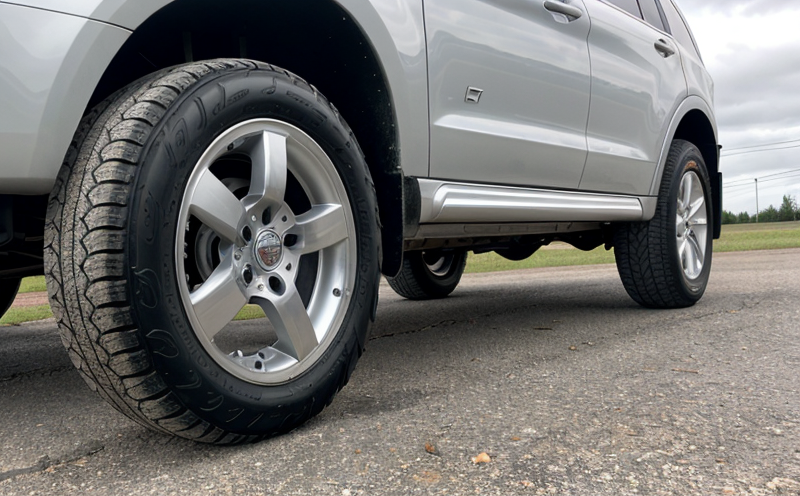EN 13261 Heat Treatment Validation Testing of Axles
The European Railway Standard EN 13261 specifies requirements and methods for heat treatment validation testing of axles used in railway applications. This service ensures that the mechanical properties of axles meet the stringent demands required for safety and reliability in rail transport systems.
Heat treatment is a critical process in the manufacturing of axles, influencing their strength, hardness, ductility, and toughness. The EN 13261 standard provides specific guidelines to validate this heat treatment through mechanical testing methods that include hardness testing, tensile testing, and impact testing at different temperatures.
Hardness testing is typically performed using a Rockwell or Vickers hardness tester, with the results being measured against specific ranges outlined in EN 13261. Tensile tests are conducted to assess yield strength, ultimate tensile strength, and elongation after fracture. Impact tests at both ambient temperature and lower temperatures simulate real-world stress conditions that axles might encounter during operation.
The testing process requires careful specimen preparation, ensuring that the specimens used for testing accurately represent the heat-treated axle material. This includes selecting appropriate dimensions and shapes suitable for the required tests as per EN 13261 guidelines. Proper labeling of specimens with batch numbers, heat treatment parameters, and other relevant information ensures traceability throughout the testing process.
Instrumentation plays a crucial role in this service. High-precision hardness testers, tensile testing machines capable of low temperature environments, and impact testers equipped for both ambient and cryogenic conditions are essential. These instruments must be regularly calibrated to ensure accuracy and reliability of results.
The acceptance criteria outlined in EN 13261 provide thresholds for passing the various tests. For instance, hardness values should fall within specified ranges based on the type of steel used and the heat treatment process applied. Similarly, tensile test results must meet minimum requirements regarding yield strength, ultimate tensile strength, and elongation after fracture. Impact test results must demonstrate adequate toughness under low-temperature conditions to ensure the axle can withstand extreme cold without failure.
By adhering strictly to EN 13261, our service ensures that axles undergo thorough validation testing, thereby enhancing overall safety and performance in railway operations. This aligns with broader industry standards such as ISO 9001 for quality management systems and ISO/IEC 17025 for laboratory accreditation.
Our team of experienced engineers and technicians is dedicated to providing accurate and reliable EN 13261 heat treatment validation testing services. We use state-of-the-art equipment calibrated according to international standards, ensuring precise measurements and repeatable results.
Applied Standards
The primary standard applied in this service is EN 13261: Heat Treatment Validation Testing of Axles for Railway Applications. This standard specifies the requirements and methods necessary to validate heat treatment processes, ensuring that axles meet the stringent mechanical property demands set by railway transportation systems.
- EN 13261: Heat Treatment Validation Testing of Axles for Railway Applications
- ISO/IEC 17025: General Requirements for the Competence of Testing and Calibration Laboratories
- ASTM E8: Standard Practice for Fabrication, Processing, and Evaluation of Tension Specimens from Welded Joints
- ISO 9001: Quality Management Systems - Requirements
The application of these standards ensures that the testing process is consistent, reliable, and compliant with international best practices. This not only enhances the accuracy and consistency of test results but also provides a robust framework for quality assurance.
Competitive Advantage and Market Impact
- Innovation Leadership: Our adherence to EN 13261 ensures that we are at the forefront of railway axle testing technology, offering innovative solutions that meet the highest industry standards.
- Compliance Assurance: By providing comprehensive heat treatment validation services, we help our clients ensure compliance with international regulations and safety standards.
- Enhanced Reputation: Clients benefit from an enhanced reputation for product quality and reliability, which is crucial in the highly competitive railway industry.
- Demand Generation: Our expertise attracts more clients seeking reliable heat treatment validation services, thereby increasing market share.
Our commitment to these standards not only differentiates us from competitors but also fosters trust and long-term partnerships with our clients. By leveraging our extensive experience and cutting-edge technology, we consistently deliver superior testing results that meet or exceed client expectations.
Use Cases and Application Examples
| Application | Description |
|---|---|
| New Product Development | Validating heat treatment processes for new axle designs to ensure they meet required mechanical properties. |
| Quality Control | Regularly checking the consistency of heat treatment processes across production batches to maintain product quality. |
| Audit Preparation | Preparing for third-party audits by demonstrating compliance with EN 13261 through comprehensive validation testing reports. |
| Research and Development | Exploring new materials or processes to improve the performance of railway axles. |
Our services extend beyond mere compliance; they are designed to support various stages of product lifecycle management, from initial design through final production. By leveraging these use cases and application examples, we help our clients achieve their business goals while maintaining the highest levels of safety and reliability.





